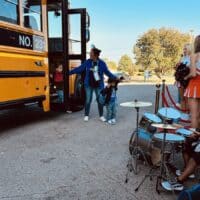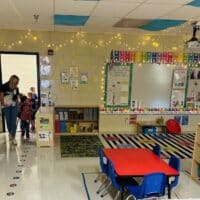When education students from Kentucky’s Morehead State University entered a virtual classroom with guest lecturer Chea Parton to discuss rural literature, many felt ashamed of the rural communities where they grew up — and where many of them would return to teach after graduation.
By the end of Parton’s guest lecture, some of those opinions had started to change.
“Even though she only spoke to my students for an hour, she already blew their minds,” said Alison Hruby, Ph.D., an associate professor of English education at Morehead.
The stories that the students read and heard as children told them that rural folk were backward and ignorant. That the land they were raised on was just flyover country. And that to find success, they must leave their hometowns and move to larger cities.
Parton, Ph.D., spoke to the students about her project, Literacy In Place, which promotes expanding literature curriculums to include works that speak directly to young rural students in middle school and high school classrooms.
By teaching stories like Wilson Rawls’s “Where the Red Fern Grows,” about a boy and his two hunting dogs in rural Oklahoma,or Julie Murphy’s “Dumplin’” about a self-proclaimed “fat girl” conquering her small town Texas beauty pageant, students are able to see themselves represented in their school work.
Parton’s lesson seemed to stick, Hruby said. The future school teachers viewed their hometowns more favorably, reflected critically on how literature can affect students’ views of where they are from, and began to think about how to incorporate Parton’s work in their own future English lessons.
“[The students] really wish they had read more literature that represented their home towns in a more positive light,” Hruby said.
Literacy In Place is an online repository of rural literature resources. Parton, a rural language and literacy scholar, launched the website to provide book lists, lessons, and activities to students, English teachers, education professors, and anyone else interested in discovering how place (specifically rural place) affects the way stories are told.
Parton said that she based Literacy in Place on three principles:
- Rural stories are worth telling.
- Rural stories are worth reading and worthy of study.
- And rural cultures (imperfect as they may be) are worth sustaining.
“I realized that rural culture is a culture and that it’s different,” Parton said. “I started thinking about me as a teacher and how my rurality affects the way I teach. Nobody was doing that work. That’s when I started Literacy in Place.”
Parton said many middle and high school classrooms use culturally sustaining pedagogies, or teaching practices, that integrate community history and culture into lessons and activities. That approach teaches students core academic skills through their own unique identities.
She realized that while this practice successfully uplifts many urban and suburban stories, rural schools there are many important rural narratives left untold. And that the absence of these stories allows negative rural stereotypes to persist.
“In teacher education programs, when we teach what culturally sustaining pedagogy is,” Parton said. “We teach from an urban perspective because that’s where it came from. So no one’s really learning how to sustain rural cultures in their teaching — even teachers who come from rural places.”
Parton — who traded soybean fields in rural Indiana for city streets in Austin, Texas — sees herself as a prime example of what happens when rural life is not celebrated or sustained.
“Growing up, I ingested all of the negative things that people say about rural people and I believed those things,” Parton said. “I believed them about myself.”
Parton’s relationship with rural life and her passion for literature have affected her teaching methods. She believes that most people don’t recognize the value or complexities of rural people and small town life.
The key, she said, is that it’s not just city folks who make this mistake, but rural folks as well. And people make these discoveries about themselves and others through literature, she said.
“I think that literature is so powerful in helping people understand their own identities and understanding identities different from theirs,” Parton said. “Because story is identity and identity is story.”
Stephanie Reid, Ph.D., an assistant professor of literacy education in the Phyllis J. Washington College of Education at the University of Montana, incorporated Parton’s program into her spring 2022 young adult literacy and literature class.
Reid and her students found that Parton’s work also highlights the complexity that exists within rural identity.
“My students paid especially close attention to their own assumptions and definitions regarding rural life and living and to how those assumptions were shaped by where they are from and the communities in which they have spent time,” Reid said. “I believe it also heightened their appreciation of the importance of place and the diversity of rural identities and experiences that exist across rural contexts and communities.”
When Reid’s students begin teaching in their own classrooms, she hopes the future educators “know and value their students and that they take the time to learn the people and communities that comprise the teaching context.”
The influence of Parton’s program on students encourages Hruby and Reid.
“I’m really excited that she’s doing what she’s doing,” Hruby said. “Because it seems like such a small thing, but it’s really going to have a huge impact.”
They also hope Parton’s work marks a shift in the education field—one that amplifies important rural perspectives and voices from their current spot at the back of the line.
“Rural educators and students have constructed incredible knowledge, and university personnel should seek to create spaces for these folks to share their knowledge and expertise,” Reid said. “Those from non-rural backgrounds will benefit from listening, reading, and learning.”
For Parton, the work continues. She hopes to re-write and correct the meaning of “rural” in the hearts and minds of young folks across the country.
“This is what culturally-sustaining teaching in a rural capacity would look like,” Parton said. “Being critical of rural places and not looking at them through rose-colored glasses, but at the same time helping the things that are really special and unique and important about rural places flourish.”
Lane Wendell Fischer is a reporting fellow for The Daily Yonder.





